February 16, 2026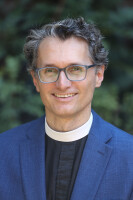 Dear saints,
Dear saints,
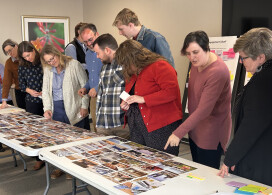 At the heart of so much of that activity is the incredible staff of our parish. Over the past couple of weeks, I have been meeting with them one-on-one to reflect on the previous year and to gain a sense of how, to quote Frederick Buechner, their "deep gladness and the world's deep hunger meet" through the ministries of this church. What was so fulfilling and humbling about that experience was to see in quick succession how thoroughly and at what depth the staff of this church see their vocational lives finding expression here.
At the heart of so much of that activity is the incredible staff of our parish. Over the past couple of weeks, I have been meeting with them one-on-one to reflect on the previous year and to gain a sense of how, to quote Frederick Buechner, their "deep gladness and the world's deep hunger meet" through the ministries of this church. What was so fulfilling and humbling about that experience was to see in quick succession how thoroughly and at what depth the staff of this church see their vocational lives finding expression here. 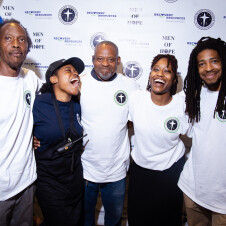 ‘Seeing the world through other’s eyes’ is very much the order of the day at this stage of our work with our architects, Perkins and Will. Over the next few weeks, we will be working hard to draw near to our staff and our core ministries so that we can see and hear as fully as possible how they imagine living out their vocation as Christ’s hands and feet over the years ahead. The Midtown Assistance Center and Covenant Community will gather board members, staff, residents and clients, volunteers and donors, so that they can share with our architects how their vision for their futures might be expressed through the Egleston ministry center. A similar exercise will happen with our Threads team of volunteers, staff and supporters, as indeed it will for our garden guild, and our music ministries here at All Saints’.
‘Seeing the world through other’s eyes’ is very much the order of the day at this stage of our work with our architects, Perkins and Will. Over the next few weeks, we will be working hard to draw near to our staff and our core ministries so that we can see and hear as fully as possible how they imagine living out their vocation as Christ’s hands and feet over the years ahead. The Midtown Assistance Center and Covenant Community will gather board members, staff, residents and clients, volunteers and donors, so that they can share with our architects how their vision for their futures might be expressed through the Egleston ministry center. A similar exercise will happen with our Threads team of volunteers, staff and supporters, as indeed it will for our garden guild, and our music ministries here at All Saints’.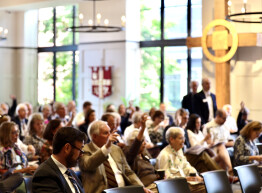 At the core of all of this listening is our parish, the beating heart of All Saints’. Later in the spring there will be opportunities for larger gatherings of the saints to be convened so that we continue to listen well to one another throughout this work. In the meantime, I continue to enjoy listening to your priorities for our church’s life as we work to execute the first phase of our master plan for the block. I welcome any of you to be in touch however you prefer to do so.
At the core of all of this listening is our parish, the beating heart of All Saints’. Later in the spring there will be opportunities for larger gatherings of the saints to be convened so that we continue to listen well to one another throughout this work. In the meantime, I continue to enjoy listening to your priorities for our church’s life as we work to execute the first phase of our master plan for the block. I welcome any of you to be in touch however you prefer to do so.
Peace,

The Rev. Dr. Simon Mainwaring, Rector
Future of Our Block E-Mail Update Archives
|
Future of Our Block Resources
Future Church Task Force Report
Future of Our Block Parish Engagement Report
Future of Our Block Parish Engagement Report Appendix
Video Archives
|
How Does God Call Us Forward?
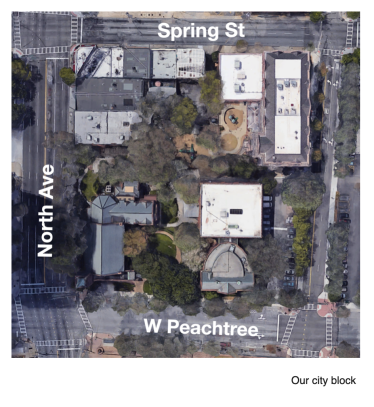 Thanks to the generosity of the people of this parish, we now own the entirety of our block. This achievement, one long hoped for by parishioners who came before us, now offers us the exciting opportunity to envision together how we can leave a legacy for future generations.
Thanks to the generosity of the people of this parish, we now own the entirety of our block. This achievement, one long hoped for by parishioners who came before us, now offers us the exciting opportunity to envision together how we can leave a legacy for future generations.
In the fall of 2018, a steering committee was commissioned by the vestry to guide the parish over the coming years through the work of discerning the future of our block. During the first year, noting all that was happening in our immediate neighborhood of Midtown, the committee determined that we would be well-served by committing to a time of learning together.
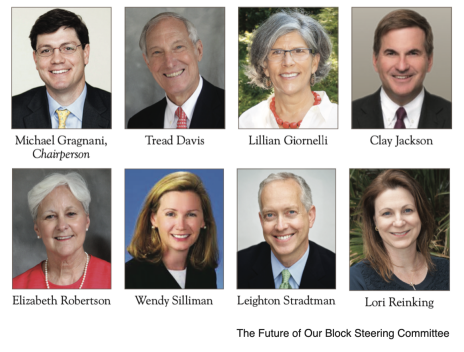
The committee began their work by meeting with different partners in our community to learn about the changing face of Midtown, including Midtown Alliance, Georgia Tech, and Emory Healthcare.
One of the repeated messages we heard was how much Midtown is changing. For the past four decades, Midtown Alliance, a nonprofit coalition of business and community leaders, has been at the heart of that change. It focuses on planning and development in Midtown, and their assessment is that Midtown is becoming one of America’s most vibrant residential and commercial urban neighborhoods.
During our year of learning, we heard three key strengths that Midtown offers to those who work, make home, and play here, which are most pertinent to our own place in this part of the city of Atlanta.
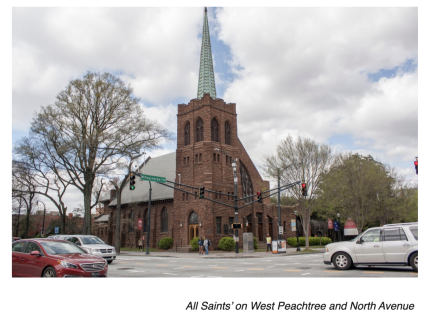 Midtown is a Walkable Urban Neighborhood
Midtown is a Walkable Urban Neighborhood
Midtown is fast becoming one of the most desirable places both to live and work in Atlanta. Year by year, more and more people drive and walk by our block, and come to see our place on the landscape as part of a larger walkable and accessible whole. Our neighborhood is increasingly a place where people want to be, and linger, and enjoy one another’s company, the very things we rely on ourselves for the formation of our own community.
Midtown is Becoming a Hub for Talent and Innovation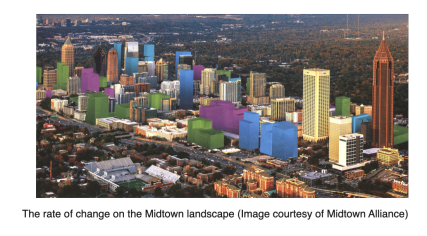
If we were to trace a line from our corner on North Avenue, down West Peachtree past Tech Square, we would pass through one of the most concentrated hubs of innovation and technology in the country. The most prominent example for us is the new headquarters of Norfolk Southern across the street, focusing its operations and innovation work within this West Peachtree tech corridor.
The exciting invitation that this hub of innovation presents to us as a church is how our own mission and ministries might continue to adapt and grow to meet the needs and excite the imaginations of those innovating, literally down our street.
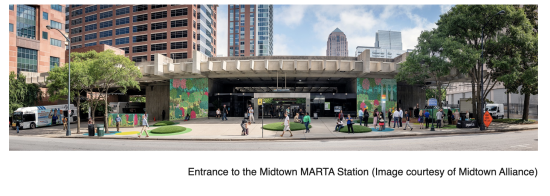
Midtown is Accessible via Public Transportation
Our neighborhood has the benefit of having three MARTA Stations: North Avenue, Midtown, and Arts Center. Access to public transportation is one ofthe key drivers of the growth and development of Midtown. We are placed right at the heart of that transit zone, and have an opportunity to invite in the thousands who pass by our beautiful block every day.
In conversation with two of Midtown’s largest institutions, Georgia Tech and Emory Healthcare Midtown, we heard two themes that characterize much of what we see developing around us: innovation and collaboration.
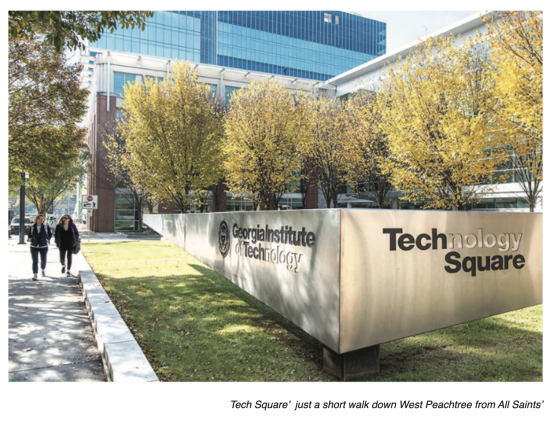 Innovation
Innovation
Both Georgia Tech and Emory Healthcare in Midtown have a strong focus on innovation. Nearly 25 years ago, Georgia Tech had a vision to effectively connect the university to the Midtown community through a development now called Technology Square.
The district, just north of us in Midtown, has evolved to combine research, business, and education such that innovative enterprises, from small business start-ups to large international corporations, have planted and blossomed in our immediate neighborhood increasingly year by year.
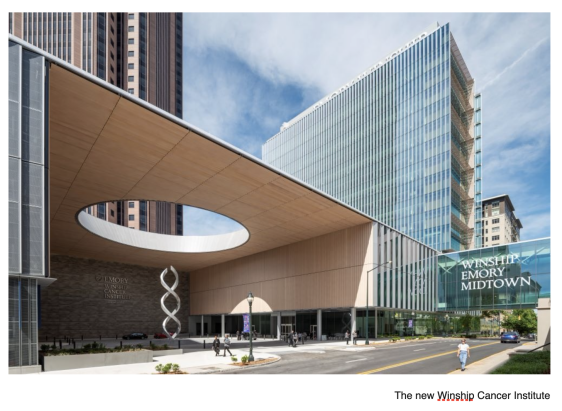
Emory Healthcare has made significant investments in Midtown over the past few years. The recently opened Proton Therapy Center provides advanced radiation technologies for cancer patients and the construction and opening of the new Winship Cancer Institute has enabled Emory Healthcare to have one of the leading cancer care facilities of its type in the country right down the street from our church.
Collaboration 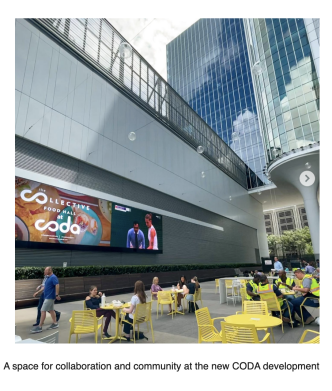
Technology Square has created a place for the community, the university, and businesses to share space and work together creatively and effectively. The most prominent example is CODA, a mixed-use building for university researchers, students, and companies to work side by side in a space that is intentionally built for collaboration and relationship-building. Both the inside and outside of the building were designed for small and large groups to gather to share space and ideas.
Serving Those In Need
As we ponder how God might invite us forward as a church, another vital part of our landscape are the many service agencies in the area. Steering committee members engaged in a broad array of conversations with service agencies, both faith-based and secular, based in Midtown and further afield around Atlanta.
The committee spoke to 40 service agencies that provide education, advocacy, healthcare, housing, food, shelter, job training, and more. We connected with many of these organizations based on their existing relationships with our four core ministries, Covenant Community, Threads, Refugee Ministries, and the Midtown Assistance Center.
From these conversations, we learned about all of the incredible work that happens around us, at all hours of the day and night, to serve vulnerable populations, including children, refugees, and people experiencing a wide variety of crises from homelessness and food insecurity to illness, violence, and more.
We asked the leaders of these organizations two key questions to find out more about the scope of their work today and their vision for the future:
- What are your biggest challenges?
- What do you perceive to be the unmet needs of the communities you serve?
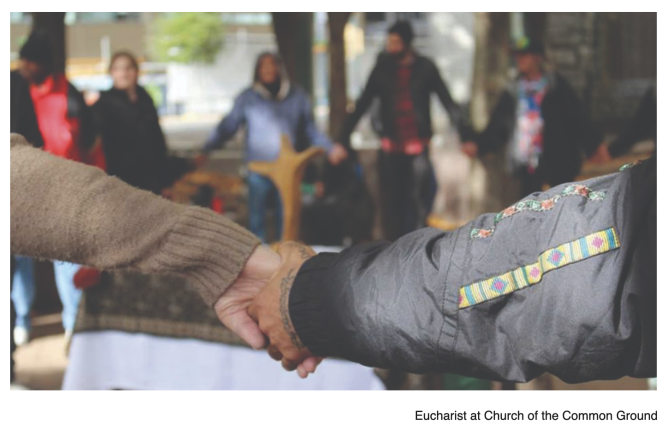
From their answers, we learned more about their greatest needs and most prevalent concerns for the future and saw some common themes emerge with certain core needs identified:
- More stable, affordable housing.
- Greater access to tutoring and after school/ summer school programs for children.
- More job opportunities for people in transition.
- Greater resources to support mental health and long-term recovery from addiction and illness.
- Wider access to transportation to bridge the gaps that MARTA doesn’t reach.
- More collaboration among non-profits and the space to do so.
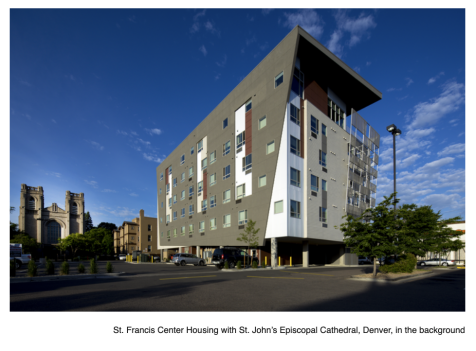
Learning from our Sister Churches
The final stage of our learning work was to understand what other churches are doing with their buildings and grounds, both here in Atlanta and across the country. As part of that learning, we engaged in a series of annual ‘Gift of Place’ conferences sponsored by Trinity Episcopal Church on Wall Street, New York City. All Saints’ presented at the inaugural conference at the Kanuga Camp and Conference Center, and did so again at following conferences online. We also co-led workshop sessions at the Episcopal Parish Network conference in Atlanta.
As we learned about what our sister churches are doing, we saw a few key patterns emerge.
A number of churches are looking to expand existing or to build new residential components to their mission as a church.
In Denver, St. John’s Episcopal Cathedral's St. Francis Center (sjcathedral.org/saintfrancis) is working in collaboration with the Colorado Housing and Finance Authority to provide permanent supportive housing for 50 formerly homeless people.
Closer to home in Midtown, First Presbyterian Church (firstpresatl.org/about) is improving space for ministry partners and overhauling their Women’s Transformation Center, turning dorm-style accommodations into nine micro-
apartments that house women in transition, rent free, for up to twelve months.
One of the most ambitious projects locally is at First United Methodist Church of Atlanta where the church is seeking “to bring a “God-size vision” for affordable housing and mix-use community space to life in downtown Atlanta”.
The project intends to build 320 new homes, 192 of which would be affordable units, and 80 Atlanta subsidized units. There are also plans to incorporate a new school, retail space and parking.
Such larger scale projects are complimented by churches like Church of the Advocate in Chapel Hill, NC, who in collaboration with Pee Wee Homes is building a tiny home village on its church grounds.
St. John’s Episcopal Church, Getty Square, NY (episcopalarts.org/about) is embarking on a similarly transformational journey in the construction of a performing arts high school next to its historic 19th century church building.
Church of the Heavenly Rest in Manhattan (heavenlyrest.org) also houses a school and with it Bluestone Lane Café drawing visitors into the church’s property through the week, hosting arts performances and exhibitions and utilizing its commercial kitchen for a back-to-work program for formerly incarcerated individuals.
The common thread to each of the projects we have been in dialogue with is ‘transformational community’. We are seeing the difference churches can make in their respective locations because they already are engaged in sharing life together with the local communities around them in various ways and are committed to serving Christ in the lives of others.
Our Guiding Principles
A little over thirty years ago, All Saints’ produced a video called ‘Here to Stay’. Our first guiding principle is that we are indeed here to stay! We have no desire or intention to sell our property. Midtown is where our future lies and we are excited about and committed to serving God in this place for decades to come.
The end of that video named some essential elements of our church: acceptance, innovation, education, worship, family, openness, change,
service, witness, outreach, and at the heart of it all, people. The values of that era remain our values today. More valuable than any corner of our block, our highest and best at All Saints’ is and always will be people.
Alongside this core conviction, several other central tenets of our work have emerged thus far. As the beating heart of our life as a parish, we will retain our church building as it is. Our historic place of worship is a treasure we wish to preserve and invest in so that it can be a beacon of hope in the lives of the saints of today and for generations to come.
We also see our green spaces as an incredible asset to the city and to our life as a church, and we wish to safeguard those spaces even as we imagine how our bricks and mortar might change.
We know that there is a need for us to have adequate parking to meet the transport demands of a wide-spread population of church-goers.
We are clear that we want our activity and building spaces on this block to further our mission as a church and at the same time we wish to be mindful of our responsibility to the future as faithful stewards of Christ in this place, looking to our long-term financial sustainability and our environmental impact.
These are guiding principles that we have identified thus far. They are not exhaustive and we anticipate as we move into a focused engagement process as a parish that further principles, needs and desires will emerge.
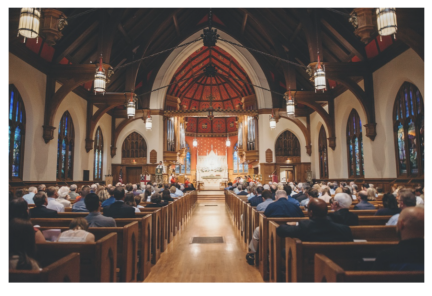 Engaging the Parish
Engaging the Parish
Building on all that we have learned, during the first half of 2024, we will engage in a parish-wide conversation about the future of our block. The single desire this process of engagement has is to listen to our parish.
There are multiple ways by which we invite that listening to take place:
- Come to one of three town halls in Ellis Hall (Sundays January 28th, February 11th and February 18th).
- Attend one of ten home gatherings (between February 29th and April 21st).
- Complete a parish-wide survey available online and on paper.
- Share free-form thoughts via a QR code online and on paper.
- Engage in informal conversations with members of the steering committee, the vestry, and the staff.
- Share ideas by writing to a dedicated future of our block email address:
- Call the church office and ask to chat to the rector!
Our aim is to conclude our initial listening work by May 2024. At that point, the steering committee will report back to the parish all that we have learned.
To help us achieve that goal, we are working with Houser Walker, a firm that specializes in master planning and has worked with a large number of churches and other organizations facilitating processes of listening and discernment.
Ultimately, all of this work will return to where it began with the steering committee making a recommendation to the vestry which will make a decision about the future of our block on behalf of the parish.
As we listen to one another and cast a vision on behalf not only ourselves but future generations whose lives will be enriched through this church, we are all invited to hold All Saints’ and this process in our prayers as we ask how it is that God calls us forward in this place.
A Prayer for Discerning the Future of Our Block
Loving God, maker of the heavens and the earth,
we give thanks for the gift of the life that we share as your church.
May your Spirit of wisdom inspire our hearts and enrich our minds.
May we discern your will for the church in this place
with audacious courage and a lively hope.
And may all that we seek to be and do
be offered with humility to your glory,
through Jesus Christ our Lord. Amen.

634 W Peachtree St NW, Atlanta, GA US 30308 | 404-881-0835 | © 2026 All Saints' Episcopal Church | All Rights Reserved.




